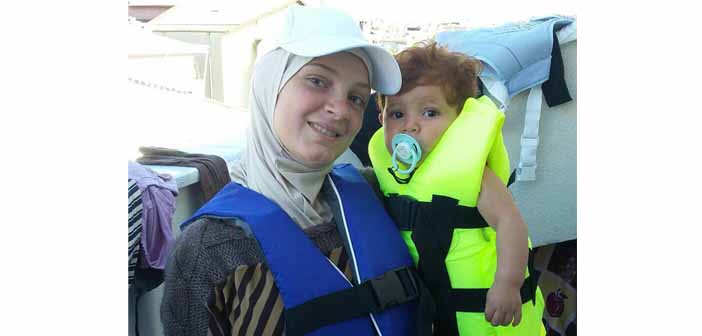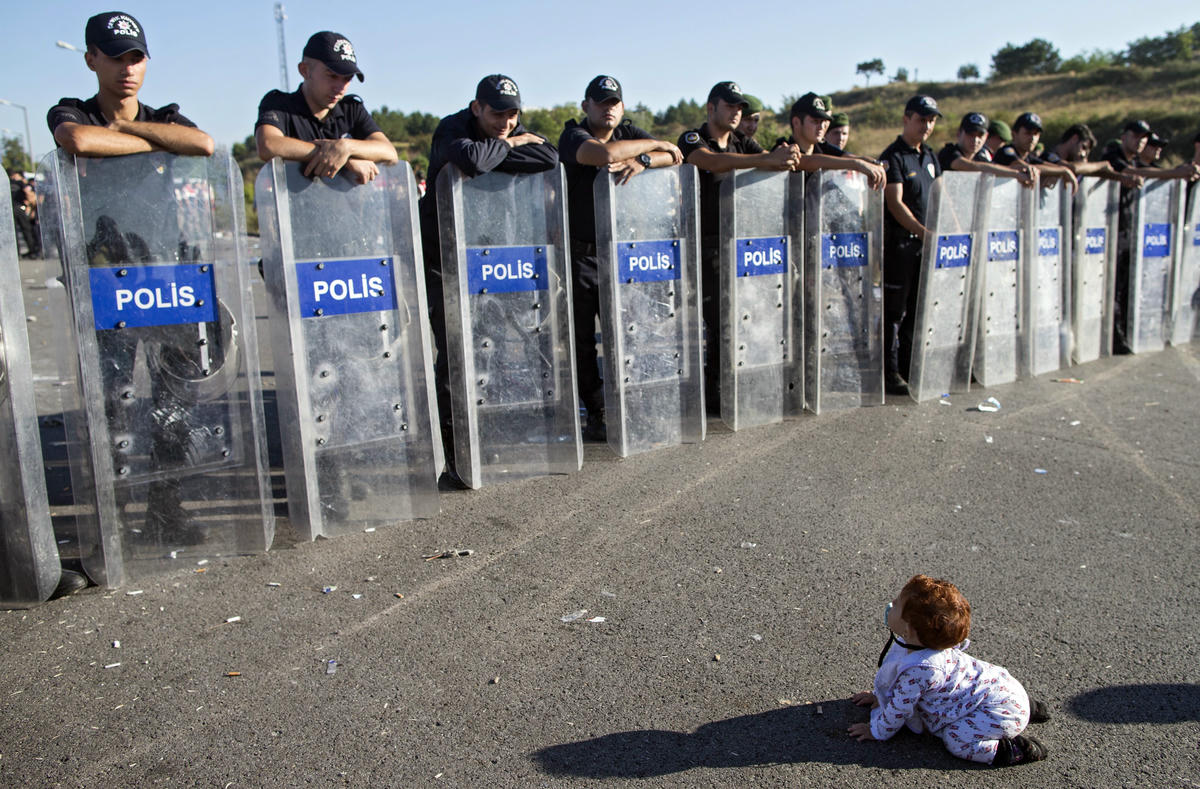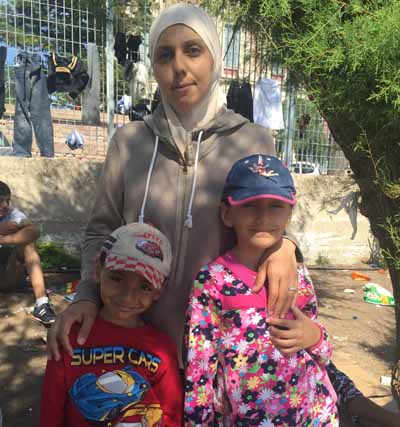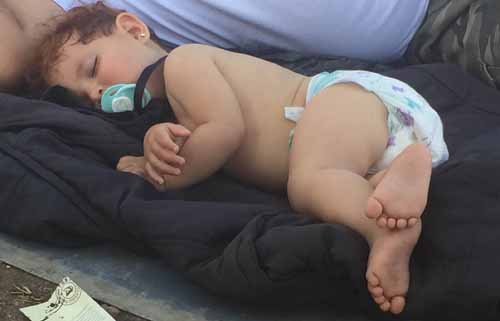Suriyeli Hüda’nın Edirne’den Midilli’ye yolculuğu


18 Eylül gecesi Edirne'ye yaklaşık 10 kilometre kala gidiş yönünün kapandığını gördük. Polisin yol düzenlemesi sayesinde biraz daha ilerleyip bir noktada durduk. Yanımdaki televizyon ekibiyle birlikte araçtan inip kalabalığın olduğu alana doğru ilerledik. Yerde yatan insanlar olduğunu fark edip, üstlerine basmamak için dikkat ederken kameraman kamerasının ışığını açtı ve hayatımda gördüğüm en tuhaf manzarayla karşılaştım. Belki iki bin kişi, gece zifiri karanlıkta yolun üstünde yatıyordu. İnsanlar karanlıkta sanki bir nehir gibi uzanıyordu. Altı tane çocuğun yerde dizilmiş bir halde uyuduğu manzarayı anlatmanın mümkün olmadığını daha o an anlamıştım. Sanki deprem olmuş, dünya başımıza yıkılmış ve herkes üstünde ne varsa sokağa fırlamış gibiydi.
Suriyeli bir ailenin 10 aylık bebeği Hüda ile o gecenin sabahında tanıştım. TEM otoyolu üstünde oturan Suriyeliler polis barikatının önünde slogan atarken, babası onu yere bırakmış, Hüda da polislere doğru emekleyivermişti. O sırada yanımdaki Reuters muhabiri Osman Orsal ve EPA muhabiri Tolga Bozoğlu deklanşöre bastığında, bu karenin ertesi gün Avrupa basınında geniş yankı uyandıracağını tahmin etmiştim. Nitekim öyle de oldu. Doğuştan kızıl saçları ve beyaz desenli pijamasıyla polislere doğru emekleyen Hüda, Avrupa'da günün konusuydu. Bunun üzerine birlikte çalıştığım televizyon ekibiyle Hüda'yı aramaya başladık.

TEM otoyolundaki kalabalık günler süren bekleyişin ardından dağılmış, birçoğu Edirne Sarayiçi'ndeki Kırkpınar güreşlerinin yapıldığı alana götürülmüştü. Elimizdeki fotoğrafı herkese gösterip Hüda'yı aramaya başladık. Kimileri bizi polis sanıyor, kimileri ise çocuğumuzu kaybettiğimizi düşünüyordu. Sonunda Hüda'yı bulduk. Sarayiçi'ne gelir gelmez banyo yapmış, saçları taranmış, kıyafetleri yıkanmıştı. Ellerindeki asfaltın grisi gitmiş, bembeyaz olmuştu.

Hüda'nın annesi Rawa ve babası Fatih sadece Arapça konuştuğu için onları bana tanıtan teyzesi Rukiyya oldu. Aslında Hüda'nın öz teyzesi değildi; yaklaşık 10 gün kadar önce Suriye'nin Der Zor kentinden birlikte bu yola çıkmışlardı ancak Hüda'yı anne yarısı kadar sahipleniyordu. Tek umutları Yunanistan'a geçebilmek, oradan da kuzeydeki Avrupa ülkelerine doğru ilerleyebilmekti. "Avrupa hiçbirimiz için daha kolay olmayacak ama buna mecburuz. Türkiye geleneklerimize daha yakın bir ülke ama burada hayat çok zor" diye anlatıyordu Rukiyya. İngilizce öğretmeni olan Rukiyya da iki çocuk annesiydi. Savaş başladığından beri öğretmenlik yapamayan Rukiyya, okula gidemeyen çocuklarına evde kendisi eğitim vermeye çalıştığını anlatıyor ancak "Bir çocuğun okula gitmesi lazım" diye ekliyordu.
O gün Hüda'nın yanından ayrılıp Suriyeli mültecilerle ilgili araştırmalarımıza devam ettik. Ama aklım Hüda'da kalmıştı. Ertesi gün Rukiyya ile konuştuğumda iki ailenin de İstanbul'a gittiğini, Yunanistan'a gidebilmek için birileriyle görüştüklerini öğrendim. Konuştukları kişilerle ilgili hiçbir şey söylemek istemedi, sonradan bunu beni korumak için yaptığını itiraf edecekti. Belli ki görüştükleri kişiler kaçakçıydı ve tehlikeli kişilerdi. Yunanistan'a nereden geçeceklerini bile bilmiyorlardı. "Nasıl gideceksiniz" diye sorduğumda o kişiden gelecek haberle birlikte otobüse bineceklerini, bir süre yolculuk yaptıktan sonra da bota binerek Yunanistan'a geçeceklerini söylüyordu.
Günlerim Hüda'yı düşünerek geçmeye başladı. Onu düşündüğümde gözümün önüne gelen tek görüntü, Bodrum sahiline cesedi vuran minik Aylan'ın fotoğrafı oluyordu. Elimde olmadan o kızıl saçlı bembeyaz bebeğin de sonunun, Aylan gibi olmasından korkuyordum.
Ertesi gün Rukiyya'dan bir telefon daha aldım. Önceki gece Yunanistan'a geçmeye çalıştıklarını ancak jandarma tarafından yakalanarak geri gönderildiklerini ama tekrar deneyeceklerini söyledi. Sonraki gün defalarca aramama rağmen iki aileden de kimseye ulaşamadım. Artık ümidimi kaybetmiştim. Sadece ajansları takip edip, mültecileri taşıyan teknelerle ilgili bir haber olup olmadığını kontrol ediyordum.
Çanakkale'den veya Ayvalık'tan botla Midilli'ye geçmenin bedeli yetişkinler için 1.200 Euro, 2 yaşından küçük çocuklar için 600 Euro. Ailesi Hüda için para almadıklarını söylüyor. Yolculuğun en masraflı bölümü bu olsa da sadece bununla bitmiyor. Midilli'ye ulaşana kadar bir kişinin yolculuk masrafı neredeyse 2.000 Euro’yu buluyor. Suriyeli iki aile Suriye'nin Der Zor kentinden çıktıkları yolculukta Kilis, Gaziantep, Mersin, Ankara, İstanbul, Edirne ve tekrar İstanbul'dan sonra Midilli'ye ulaşabilmişler.
Böylelikle iki gün daha geçti ve bir sabah Rukiyya aradı. Savaştan, IŞİD'den ve daha birçok şeyden kaçan o kadının sesini ilk defa mutlu duymuştum. "Biz Yunanistan'dayız, geleli daha birkaç dakika oldu" dedi. Yunanistan'ın hangi adasında olduklarını bile bilmiyordu. Birkaç saat sonra Midilli adasında olduklarını öğrendi.
Bu haberi alır almaz hemen Midilli'ye hareket ettik. Ertesi gün Hüda ile tekrar kavuştuk. Hepsinin yüzü gülüyordu.
15 kişilik botta 48 kişi
Kişi başı 1.200 euro verdikleri kaçakçılar onları otobüsle Çanakkale'ye götürmüş ve orada bir bot vermişti. Botu şişirmelerini ve bir an önce yola çıkmalarını söylemişlerdi. Rukiyya "Sana söyleyemezdim, sahile gittiğimizde pompalı tüfekle bekleyen iki kişi vardı" diye anlatıyordu. Ancak onları asıl korkutan silahlar değil denizin kendisi olmuştu. Kaçakçılardan biri bota binip motoru çalıştırdıktan sonra denize atlayıp sahile geri dönmüş ve kaderleriyle baş başa kalmışlardı. Botu Rukiyya'nın eşi kullanmak zorunda kalmıştı. Onlarla birlikte yolculuk yapan Erbilli bir mültecinin verdiği bilgiye göre 15 kişilik bota tam 48 kişi binmişlerdi. Rukiyya "üst üste oturduk" diye anlatıyordu. Denizin ortasında, zifiri karanlıkta motor birden durunca o kadar korkmuşlar ki, Rukiyya o anlar için "Ölümle burun buruna geldik" diyordu.
Dört yıldır savaş yüzünden Suriye içinde tam dokuz kez yer değiştiren, son bir yıldır Der Zor IŞİD kontrolünde yaşayan, gözünün önünde insanlar öldürülen Rukiyya'ya şimdiye kadar yaşadığı en korkunç şeyin ne olduğunu sorduğumda "Denizi geçmekti" diye yanıt verdi.
Hüda'yı en son Midilli Limanı'nda bir ağacın gölgesinde mışıl mışıl uyurken bıraktım.

Onlar ise yolculuklarına Makedonya, Sırbistan ve Hırvatistan üzerinden devam etti. Hüda'nın ailesi Hollanda'ya gitmek istiyor. Rukiyya ve eşi ise henüz karar vermiş değil, "İsveç veya Danimarka olabilir" diyor.
Suriyeli iki aileyle aynı botta Midilli'ye geçen Iraklı bir mülteci, kaçakçıları Aksaray'da bulduğunu anlatıyor. Otobüslerle bota binecekleri alana götürüldükten sonra birkaç otomobille kaçakçıların geldiğini anlatan Iraklı mülteci, bu kişilerin arasında iki Azeri, bir Arap ve üç Türkiyelinin olduğunu söylüyor. Aynı mülteci, yaklaşık 8-10 kadar kaçakçı çetesinin birlikte çalıştığını, patronlarının ise bir Suriyeli olduğunu söylüyor.


